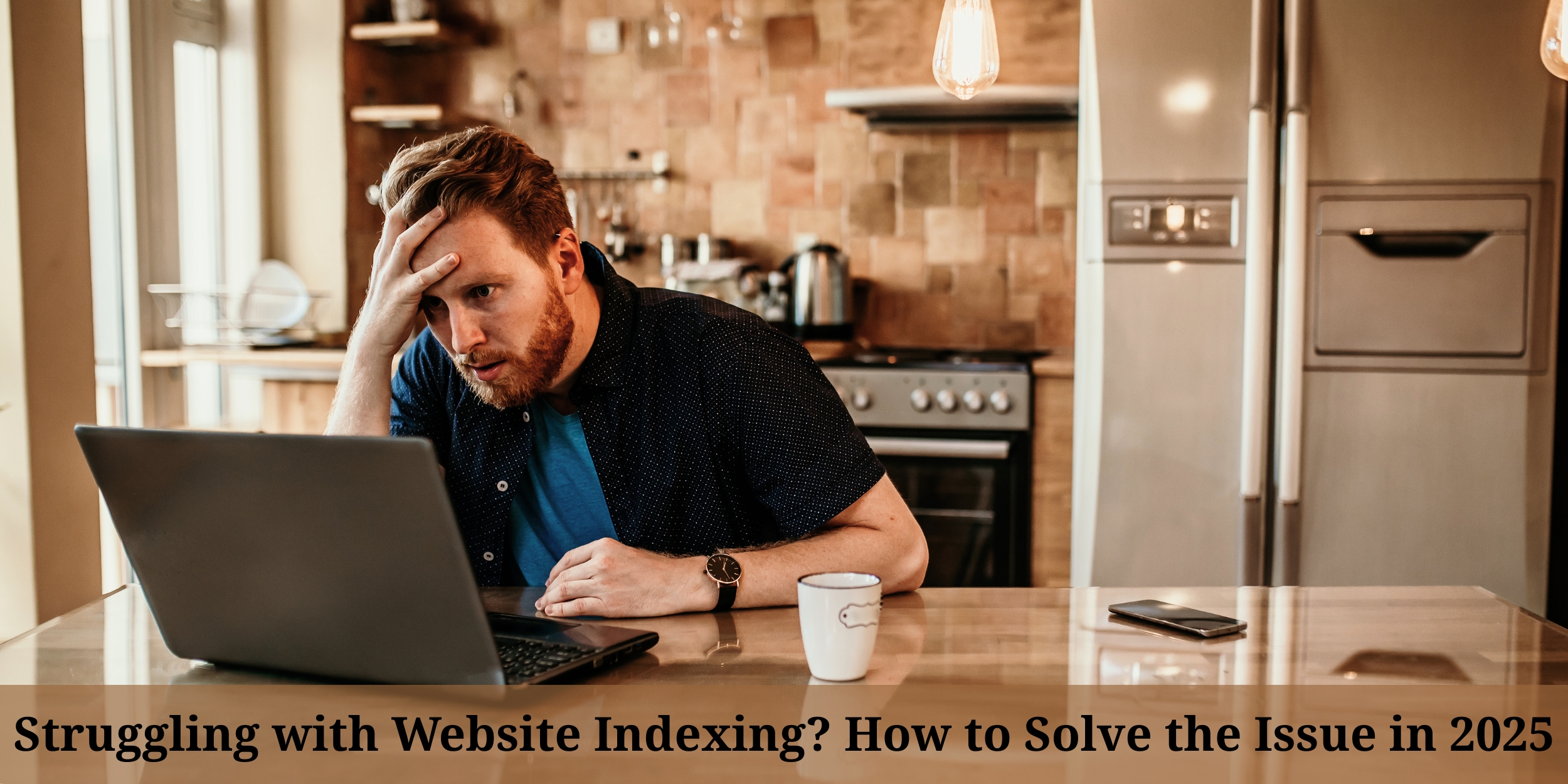If your website pages aren't appearing in Google's search results, there's a good chance your pages aren't indexed. Indexing is crucial for SEO (Search Engine Optimization) because it's the first step for your pages to show up on search engines. Without proper indexing, even high-quality content will remain invisible to users and search engines alike. In 2025, ensuring your website is properly indexed is as important as ever—especially since Google's algorithms continue to evolve.
In this comprehensive guide, we'll dive into the common reasons why website pages don't get indexed and, more importantly, provide actionable steps on how to fix the issue. Whether you're a beginner or an experienced SEO professional, understanding the indexing process and troubleshooting any issues is essential for your site's visibility and overall performance.
What is Website Indexing?
Understanding Website Indexing
Website indexing refers to the process by which search engines like Google "crawl" your site and store information about it in their databases. Essentially, Googlebot—Google's web crawling bot—visits your website, reads its content, and then decides which pages should be included in its index. This index is a massive database of web pages that Google has deemed worthy of inclusion based on their relevance, quality, and user value.
Once your pages are indexed, they can then be included in Google's search results, making it possible for your audience to discover them. If a page is not indexed, it won't appear in Google's search results, and no one will be able to find it through search engines.
Why Indexing Matters for SEO?
The significance of indexing for SEO cannot be overstated. Indexed pages are what appears in search engine results, and Google uses complex algorithms to determine how to rank those pages based on their relevance to search queries. Without indexing, your content won't be discoverable, which can dramatically reduce your site's traffic and online visibility.
If Googlebot can't index your pages, they won't be able to rank. This means that no matter how fantastic your content is, it won't drive organic traffic if it remains unindexed. Proper indexing is the first step toward improving your SEO efforts and increasing your search engine visibility.
Common Reasons Your Website Pages Aren't Getting Indexed
There are a variety of reasons why Google may not index your website pages. Let's look at the most common culprits.
Crawlability Issues
One of the most common reasons why pages aren't indexed is due to issues with crawlability. Googlebot needs to be able to access and crawl your pages to add them to the index. If there are barriers in place that block or restrict crawlers from accessing your pages, those pages won't get indexed.
Robots.txt and Blocked Crawlers
Your robots.txt file is a standard file that tells search engines which parts of your website they can and can't crawl. If this file is improperly configured, it may inadvertently block crawlers from accessing important pages on your site. For example, if your robots.txt file contains a directive such as Disallow: /, it tells search engines not to crawl your entire site.
Incorrect Meta Robots Tags
Meta robots tags are directives placed in the HTML of your web pages. If your pages have been incorrectly tagged with "noindex" or "nofollow," Google will refrain from indexing them. This frequently happens when website settings are misconfigured, or developers forget to remove the "noindex" directive from pages that should be indexed.
Technical Problems
Technical problems can also prevent Googlebot from successfully indexing your site. These issues can range from server-side problems to slow page load times and even broken links. When Googlebot encounters such issues, it may be unable to index your pages.
404 Errors and Broken Links
Broken links or 404 error pages can cause significant issues for Googlebot, especially if they appear in your site's main navigation or important sections. If pages or resources are no longer available or lead to dead ends, Googlebot may decide not to index those pages. Regularly checking for and fixing broken links is an essential part of SEO maintenance.
Slow Page Load Speed
Googlebot prefers websites that load quickly. If your pages take
Don't miss your chance to enroll now.🚀 New Batch Starting Soon!
Duplicate Content or Thin Content
Google's algorithms often flag duplicate content and thin content. Pages that are too similar to one another, or pages that don't provide enough meaningful content, are less likely to be indexed.
Duplicate Content
Google aims to provide the best results for users, and when it detects duplicate content, it often chooses to index only one version of the page. If your website has multiple pages with the same or nearly identical content, Google may only index one version and ignore the others. This is especially true for content like product descriptions, press releases, or other repetitive material.
Thin Content
Pages with thin content (meaning content that is low in value or too short) are unlikely to be indexed. Google values pages that offer in-depth and comprehensive information, so thin content is often ignored. If your pages have very little useful content, it's a good idea to revise and enrich them to make them more valuable to users and search engines.
Mobile Usability Issues
Mobile-first indexing means that Google prioritizes the mobile version of your website for indexing and ranking. If your website isn't optimized for mobile devices, Google may struggle to crawl and index it properly. Given the increase in mobile internet usage, this issue is significant for modern SEO.
How to Check If Your Website Pages Are Indexed
Before you can fix your indexing issues, you need to verify which pages are indexed by Google. Here are a few ways to check:
Using Google Search Console
Google Search Console (GSC) is an essential tool for any website owner. It provides detailed information about how Googlebot interacts with your site. To check if your pages are indexed:
- Go to your Google Search Console account.
- Navigate to the Coverage section.
- Here, you'll see a list of errors or warnings related to indexing, such as missing pages or 404 errors.
You can also check which pages are indexed by navigating to the Sitemaps section and ensuring that your sitemap is up to date and correctly submitted.
Using the Site: Search Query
A quick and easy way to check if your pages are indexed is by performing a "site:" search on Google. For example, type site:yourdomain.com into the Google search bar. This will show you a list of all the pages from your website that have been indexed.
Third-Party Tools
Several third-party SEO tools can help you assess the indexing status of your website. Tools like Screaming Frog, SEMrush, and Ahrefs can crawl your website and provide detailed information about which pages are indexed, as well as any errors that might be preventing proper indexing.
How to Fix Indexing Issues in 2025
Once you've identified the problem, it's time to fix the indexing issues. Here's how you can tackle the most common causes of indexing problems:
Ensure Your Pages Are Crawlable
Fix Your Robots.txt File
If your robots.txt file is blocking important pages, you'll need to correct it. Ensure that your robots.txt file doesn't contain any directives that block search engines from crawling essential parts of your site. If in doubt, check the file using Google's robots.txt Tester.
Check and Update Meta Robots Tags
Make sure your pages are properly tagged with meta robots tags. If you find pages that are incorrectly marked with "noindex," change them to "index" so Google can crawl and index them.
Improve Technical SEO
Fix 404 Errors and Broken Links
Broken links and 404 errors can severely hinder the indexing process. Regularly run audits using tools like Screaming Frog or Google Search Console to find and fix these issues. Ensuring that all internal links work correctly will help Googlebot crawl your pages more efficiently.
Optimize Website Speed
Page speed is not only important for user experience but also for indexing. Use Google's PageSpeed Insights or GTmetrix to analyze your site's performance and find ways to improve speed, such as image optimization, caching, and minimizing JavaScript.
Eliminate Duplicate Content
Use Canonical Tags
If your site has duplicate content, use canonical tags to indicate the preferred version of a page. This will help Google avoid indexing duplicate content and ensure that the most relevant version of a page is prioritized.
Add Valuable Content to Thin Pages
If your pages are thin on content, add more useful, relevant, and engaging information. This will make your pages more valuable to users and improve the chances of them being indexed.
Optimize for Mobile-First Indexing
Test your site using Google's Mobile-Friendly Test to see how well it performs on mobile devices. If necessary, update your website design to ensure it's fully responsive and optimized for mobile users. Given that Google uses mobile-first indexing, your mobile experience must be top-notch.
Submitting Pages for Re-Indexing
After resolving the indexing issues, you can request Google to re-crawl and re-index your pages.
Requesting Indexing via Google Search Console
To request indexing in Google Search Console, use the URL Inspection Tool. Enter the URL of the page you want to submit for re-indexing, and then click on the "Request Indexing" button. This tells Google to revisit and index the page, which can speed up the process.
Want to Learn More?
If you're new to SEO or struggling with website indexing, don’t worry — you're not alone. To build a strong foundation, start with our Digital Marketing Course, designed to teach you the basics of SEO, website performance, and Google best practices.
Need expert help to fix technical issues like indexing errors, page speed problems, or low rankings? Explore a professional SEO Agency that can boost your website's visibility and get your pages indexed faster.
Conclusion
Website indexing is a fundamental aspect of SEO that can significantly influence your site's visibility and traffic. In 2025, with constant changes to Google's algorithms and crawling technologies, it's important to stay proactive and keep an eye on any indexing issues. By understanding the causes of indexing problems and using the right tools to diagnose and resolve them, you can ensure that your pages are properly indexed and primed for high rankings.
If your pages are still not indexed after taking all the necessary steps, don't panic. It may take some time for Googlebot to revisit and re-index your content. Continue to monitor your website's health, follow best practices, and stay updated on SEO trends to avoid indexing issues in the future.



